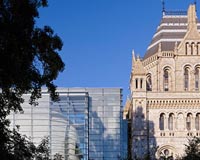| . |  |
. |
Chicago (AFP) Sept 10, 2009 Polar bear cubs, the arctic fox and caribou herds are among the victims of dramatic changes in the Arctic due to climate change, a study published Thursday found. "Species on land and at sea are suffering adverse consequences of human behavior at latitudes thousands of miles away," said lead author and biologist Eric Post of Penn State University. "It seems no matter where you look -- on the ground, in the air, or in the water -- we're seeing signs of rapid change." The study published in the journal Science reviewed recent ecosystem-wide studies of the biological responses to Arctic warming. They found the effects of a one-degree Celsius warming over the past 150 years were dramatic and cautioned that it is difficult to predict the consequences of an expected six-degree warming over the next century. "The Arctic as we know it may soon be a thing of the past," Post said. Sea ice cover has shrunk by a staggering 45,000 kilometers a year over the past 20 to 30 years, causing a rapid decline in the gulls, walruses, seals, horned narwhal whales and polar bears which rely upon it. Snow cover on land also has declined and is melting faster. Polar bears and ringed seals -- already in danger of extinction -- are losing cubs when early spring rains collapse the lairs they build under the snow. Arctic fox populations are down as red foxes move north. Fewer caribou calves are surviving because their mothers have been unable to adjust the calving season to changes in plant growth and are not getting enough to eat. Warmer summers also have increased the number of insects and parasites which prey on the migratory animals. Moths are moving north and affecting the dynamics of trace gas exchange by defoliating mountain birch forests and low Arctic trees and shrubs. That could have a significant impact on the Arctic's ability to act as a carbon sink, Post warned, noting that one study found an unexpectedly large release of methane in Greenland at the onset of autumn soil freezing. Warming temperatures are allowing shrubs and trees to expand their range and also are damaging native vegetation. One winter warming episode led to vegetation damage so extensive that plant product was cut by 26 percent over an area of at least 1,400 square kilometers. "There is little functional redundancy among species in Arctic ecosystems," Post said. "Therefore, relatively small shifts in species ranges or abundances may cause fundamental changes in a unique ecosystem that also is important for tourism and traditional cultures." Share This Article With Planet Earth
Related Links Darwin Today At TerraDaily.com
 Darwin's collections 'cocooned' at London museum
Darwin's collections 'cocooned' at London museumLondon (AFP) Sept 8, 2009 London's Natural History Museum on Tuesday unveiled an eight-storey extension in the shape of a cocoon to house the collections of Charles Darwin. The new ultra-modern white addition to the imposing Victorian museum includes the Darwin Centre, a state-of-the-art research and exhibition facility named after the father of the theory of evolution. ... read more |
|
| The content herein, unless otherwise known to be public domain, are Copyright 1995-2009 - SpaceDaily. AFP and UPI Wire Stories are copyright Agence France-Presse and United Press International. ESA Portal Reports are copyright European Space Agency. All NASA sourced material is public domain. Additional copyrights may apply in whole or part to other bona fide parties. Advertising does not imply endorsement,agreement or approval of any opinions, statements or information provided by SpaceDaily on any Web page published or hosted by SpaceDaily. Privacy Statement |